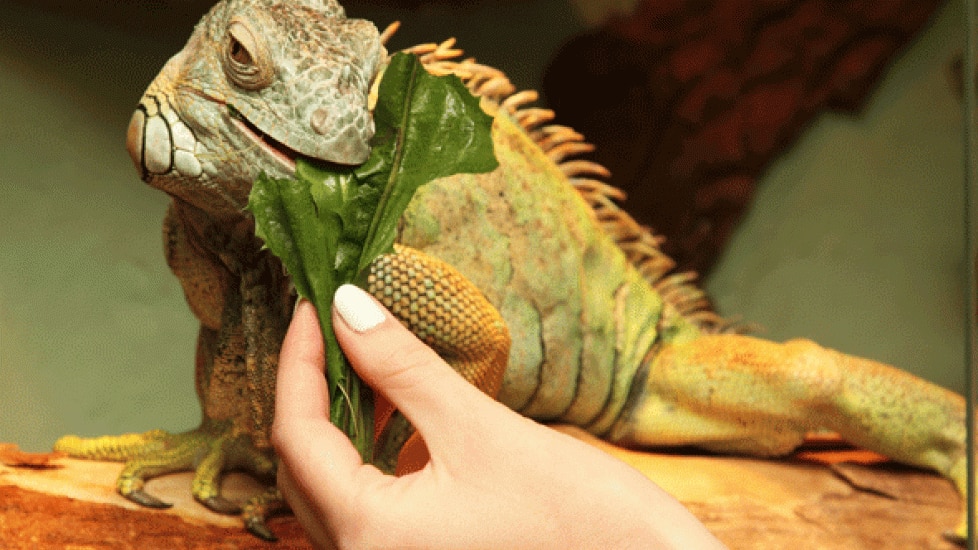What Do Lizards Eat?
By Laurie Hess, DVM, Dipl ABVP (Avian Practice)
Lizards of all kinds are very popular pets, and given the variety of lizard species available today, it can be confusing to know what to feed them. Some lizards are carnivores (eat only animal products), some are herbivores (eat only vegetable and fruit) and some are omnivores (eat both meat and vegetables plus fruit). It is impossible to generalize what lizards eat, as different lizard species require different diets to be healthy.
We know that all lizards need fresh water daily, and most also need supplemental nutrients—such as calcium and vitamin D3, plus a multivitamin—the frequency of which depends on their species, age and breeding status. Typically, supplemental vitamins and minerals are provided as a powder dusted in small amounts on insects or produce, depending on the lizard’s diet. For most commonly kept captive lizards, calcium without added vitamin D3 should be sprinkled on food every other day alternating with calcium containing vitamin D3 on the days in between. In addition, a multivitamin should be offered on food once a week. Finally, regardless of species, lizards should never be fed fire flies (also called lightning bugs), as these insects are toxic and typically kill all lizards that ingest them.
Perhaps the most commonly kept lizards today include bearded dragons, leopard geckos, and chameleons. Learn more about the feeding requirements for each species, below.
What Do Bearded Dragons Eat?
Bearded dragons are omnivores that should be a fed a mixture of fresh (rather than less-nutritious frozen or canned) produce plus live insects daily. They can have vegetables such as leafy greens, squash, carrots, peppers, broccoli, string beans, sweet potatoes, pumpkin, celery, cucumbers, and asparagus, with smaller amounts of fruit such as bananas, apples, pears, peaches, melon, plums, apricots, nectarines, watermelon, grapes, papaya, pineapple, and berries. Onions and garlic should be avoided. Insects they can be fed include mealworms, crickets, Dubia roaches, butterworms, hornworms, Phoenix worms, earthworms, silkworms, superworms, and waxworms (which should be fed sparingly, as they are fatty). All of these worms are available from pet stores; insects found outside or in homes should not be fed, as they may contain pesticides or other chemicals unhealthy for lizards. In general, younger, growing bearded dragons need more insects and a little less produce, while adult dragons eat more produce than insects.
Just as fresh produce is more nutritious than frozen or canned, live insects are more nutritious than dead ones, plus the movement of the insects stimulates the lizard’s instinctual hunting behavior. All insects should be gut-loaded (fed with fortified food) so that they are nutritious for the lizard, and the lizard should be offered only enough insects that it will eat, so that left over insects trapped in the lizard’s enclosure don’t start chewing on the lizard.
What Do Leopard Geckos Eat?
Leopard geckos are carnivores, eating only insects and no vegetables. Young geckos eat daily, while some large adults may only need to eat every other day, depending on their overall health and breeding activity. Most geckos eat predominantly mealworms and crickets, but depending on their size, they can also be fed a variety of the other worms listed above. Just as for bearded dragons, insects should be gut-loaded and only offered in numbers that the lizard will consume so that they don’t get trapped in the lizard’s tank and gnaw on the animal. Insects should be moistened and dusted with vitamins and minerals, as described above.
Be careful not to over feed the gecko, as they tend to overeat and get fat. Healthy geckos will store fat in their tails which should be plump (but not wider than their bodies), not thin and pencil-like. However, overweight geckos will develop a stomach paunch and often have fat deposited along their legs and arms, as well. Ideally, geckos should not be fed more insects than they will eat in a 20-minute period. Be sure, too, not to feed insects too large for the gecko, or they will not be able to eat them. The general rule is not to feed insects longer than the space between the lizard’s eyes.
What Do Chameleons Eat?
Chameleons are more difficult to feed (and in general, to keep overall) than other lizards. However, their popularity has increased in recent years. Most chameleons are carnivores, eating a variety of insects (see list above) plus wingless fruit flies; however, veiled chameleons will also eat vegetables such as mustard, dandelion and collard greens. Juvenile chameleons should be fed every day, while adults can be fed every day to every other day, depending on their body weight, breeding status and overall health. Insects should be offered one or two at a time until the chameleon no longer wants to eat. Insects should be dusted with mineral and vitamin supplements, as described above. Chameleons will thrust out their very (up to several inches) long tongues to catch and eat insects one at a time. Another unique feature of chameleons is that they will not drink standing water but drink it dripping off of plants in their enclosures. Automated misters are commercially available to provide dripping water to chameleons so that they stay hydrated.
Regardless of species, reptiles must be kept within their preferred optimal temperature zones, which vary by species, in order to digest food properly. Lizards, and reptiles in general, are ectotherms that depend on outside heat sources to maintain their body temperatures for optimal digestion and immune system function. Therefore, to keep your lizard healthy, it’s critical to understand not only its optimal diet, but also its optimal temperature range, so that it can process the nutritious food you offer. If you provide the ideal diet, light, heat, and humidity, you can help your pet thrive and potentially live a long, happy life.
ifong via Shutterstock
